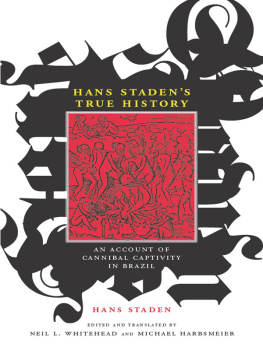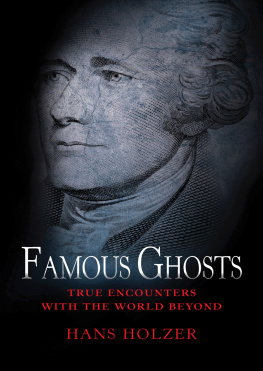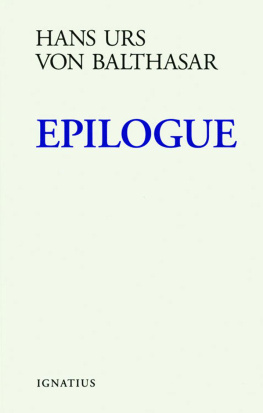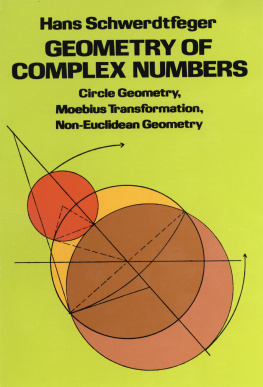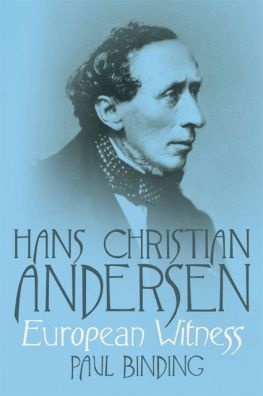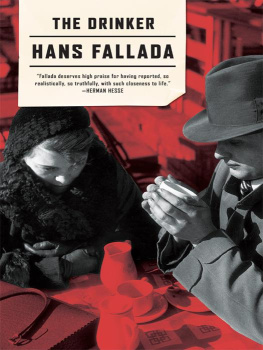Hans Staden - Hans Stadens True History: An Account of Cannibal Captivity in Brazil
Here you can read online Hans Staden - Hans Stadens True History: An Account of Cannibal Captivity in Brazil full text of the book (entire story) in english for free. Download pdf and epub, get meaning, cover and reviews about this ebook. year: 2011, publisher: Duke University Press, genre: Detective and thriller. Description of the work, (preface) as well as reviews are available. Best literature library LitArk.com created for fans of good reading and offers a wide selection of genres:
Romance novel
Science fiction
Adventure
Detective
Science
History
Home and family
Prose
Art
Politics
Computer
Non-fiction
Religion
Business
Children
Humor
Choose a favorite category and find really read worthwhile books. Enjoy immersion in the world of imagination, feel the emotions of the characters or learn something new for yourself, make an fascinating discovery.
- Book:Hans Stadens True History: An Account of Cannibal Captivity in Brazil
- Author:
- Publisher:Duke University Press
- Genre:
- Year:2011
- Rating:4 / 5
- Favourites:Add to favourites
- Your mark:
- 80
- 1
- 2
- 3
- 4
- 5
Hans Stadens True History: An Account of Cannibal Captivity in Brazil: summary, description and annotation
We offer to read an annotation, description, summary or preface (depends on what the author of the book "Hans Stadens True History: An Account of Cannibal Captivity in Brazil" wrote himself). If you haven't found the necessary information about the book — write in the comments, we will try to find it.
Hans Staden: author's other books
Who wrote Hans Stadens True History: An Account of Cannibal Captivity in Brazil? Find out the surname, the name of the author of the book and a list of all author's works by series.
Hans Stadens True History: An Account of Cannibal Captivity in Brazil — read online for free the complete book (whole text) full work
Below is the text of the book, divided by pages. System saving the place of the last page read, allows you to conveniently read the book "Hans Stadens True History: An Account of Cannibal Captivity in Brazil" online for free, without having to search again every time where you left off. Put a bookmark, and you can go to the page where you finished reading at any time.
Font size:
Interval:
Bookmark:
The Cultures and Practice of Violence Series
Series Editors:
Neil L. Whitehead, University of Wisconsin, Madison
Jo Ellen Fair, University of Wisconsin, Madison
Leigh Payne, University of Wisconsin, Madison
The study of violence has often focused on the political and, the suffering of victims, and the psychology of its interpersonal dynamics. Less familiar are the role of perpetrators, their motivations, and the social conditions under which they are able to operate. In the context of postcolonial state building and more latterly the collapse and implosion of society, community violence, state repression, and the phenomena of judicial inquiries in the aftermath of civil conflict, there is a need to better comprehend the role of those who actually do the work of violencetorturers, assassins, and terroristsas much as the role of those who suffer its consequences.
When atrocity and murder take place, they feed the world of the iconic imagination that transcends reality can bring further violent realities into being. This series encourages authors who build on traditional disciplines and break out of their constraints and boundaries, incorporating media and performance studies and literary and cultural studies as much as anthropology, sociology, and history.
Edited and translated by Neil L. Whitehead and Michael Harbsmeier
Duke University PressDurham and London2008
2008 Duke University Press
All rights reserved.
Printed in the United States of America on acid-free paper 
Designed by Heather Hensley
Typeset in Adobe Garamond Pro by Tseng Information Systems, Inc.
Library of Congress Cataloging-in-Publication Data appear on the last printed page of this book.
(Captions have been added by the editors; none appear in the original text.)
Hans Stadens Warhaftige allies to the French. In this way the work, although chiefly famed until now as a text on Tupian cannibalism, is no less important for appreciating the nature of European colonialism in Brazil and how that context was significant for the emergence of various ethnic and national antagonisms in Europe. In fact the issue of cannibalism, although obviously prominent in Stadens text and its accompanying visual illustrations, is by no means the only matter of contemporary interest to historians and anthropologistshow and why this should be so is part of the purpose of the introductory essay to explain.
It therefore needs to be emphasized at the outset that Stadens Warhaftige Historia has become a key reference in the resurgent debate on cannibalism and its discourses; a debate that had its very origins at the moment of the texts production, such as in the speculations of Michel de Montaigne, who also conversed with Tupi people brought as living exhibits to France, as well as in the way the idea of Brazilian cannibalism was used to mediate European controversies about the eucharistic cannibalism of Jesus Christ in Christian religions of the period.
So too, Stadens text has a particular significance in contemporary Brazil as both a source for Oswald de Andrades inspiration for a distinct Brazilian modernismtermed the antropofagista movementand for the visual reinterpretation of the woodcuts in the Warhaftige Historia by Candido Portinarithe Brazilian Picasso. A more popular legacy for the Warhaftige Historia is also evident in the production of childrens literature based on Stadens storyManuel Lobatos Aventuras de Hans Staden has gone through eleven editions and been in print since 1927making Hans Staden somewhat analogous to Davy Crockett as an icon of the wild frontier. There are also renderings of Stadens account in contemporary Brazilian cinema, notably by Nelson Pereira dos Santos in 1974 but also as recently as 2000 in a film by Luiz Alberto Pereira.
Despite this cultural genealogy there has not been an English-language version since Malcolm Lettss edition of 1928, and only two versions in modern German since Fouquets edition in 1941.
Undoubtedly part of the continuing importance of Stadens text is precisely the way in which it relates to current debates on knowing or interpreting others distant in both cultural space and historical time, and the issue of cannibalism vividly highlights ideas of such difference. It is therefore crucial to note that it was the issue of observation, not of cannibalism, that was taken up in the introduction to Stadens work by Johannes Dryander, a professor of medicine at the University of Marburg, where the work was first published. As such the Warhaftige Historia is perhaps uniquely important among the class of early colonial documents more generally, not for the representations of savage cannibalism, for which the work is currently notorious, but for the way it broaches questions of observational epistemology, as well as the meanings of captivity and cultural difference. Nonetheless, the appearance of the cannibal sign in an early and highly intense form through Stadens text can hardly be denied, but it is important to remember that this reflects European concerns and anxieties of the time, and the relevance, if any, of Stadens observations to the reconstruction of past cultural practices of the Tupi will be part of the task of the Introduction to explain.
This work has had a long gestation and the intellectual support and encouragement of our colleagues has been invaluable. In particular we would like to thank Peter Hulme for suggesting the collaborative project and Stuart Schwartzs consistent enthusiasm for its outcomes. We trust that the text that follows meets those expectations. We would also like to thank Nils Holger Berg for assistance in making this translation.
Gordon Brotherston, Antnio Curet, Jose Rabasa, Lucia Sa, Kevin Terraciano, and Lee Wandel all deserve particular thanks for their interest in this work. Presentations given at Stanford, the Chicago Field Museum, UCLA, and the University of Wisconsin were invaluable for the comments on the editorial strategies we have pursued, and thanks are due both the organizers and audiences.
We would also like to thank Walter Schiffner of the Wolfhagen Museum for organizing a conference in 2007 celebrating the 450th anniversary of the original publication of Stadens account where the comments of encouragement of a variety of Staden scholars from Germany, France, and Brazil were invaluable. This was also the occasion for the celebration of a new translation of Stadens text into modern German and Portuguese by Franz Obermeier, Joachim Tiemann, and Guiomar Carvalho Franco (2006). We refer the interested reader to the detailed comments contained in the notes to this critical philological edition as well as in the Introduction and its exhaustive bibliography.

The Warhaftige Historia itself originally comprised one hundred and seventy-eight folios and fifty-five woodcut illustrations and a map. The first edition was published in Marburg on Shrove Tuesday in 1557 by Andrs Kolben at the sign of the Clover Leaf. A second printing by Kolben in the same year omitted the map of Brazil and its native peoples that appears in the first printing (EA I: 88).
Font size:
Interval:
Bookmark:
Similar books «Hans Stadens True History: An Account of Cannibal Captivity in Brazil»
Look at similar books to Hans Stadens True History: An Account of Cannibal Captivity in Brazil. We have selected literature similar in name and meaning in the hope of providing readers with more options to find new, interesting, not yet read works.
Discussion, reviews of the book Hans Stadens True History: An Account of Cannibal Captivity in Brazil and just readers' own opinions. Leave your comments, write what you think about the work, its meaning or the main characters. Specify what exactly you liked and what you didn't like, and why you think so.

